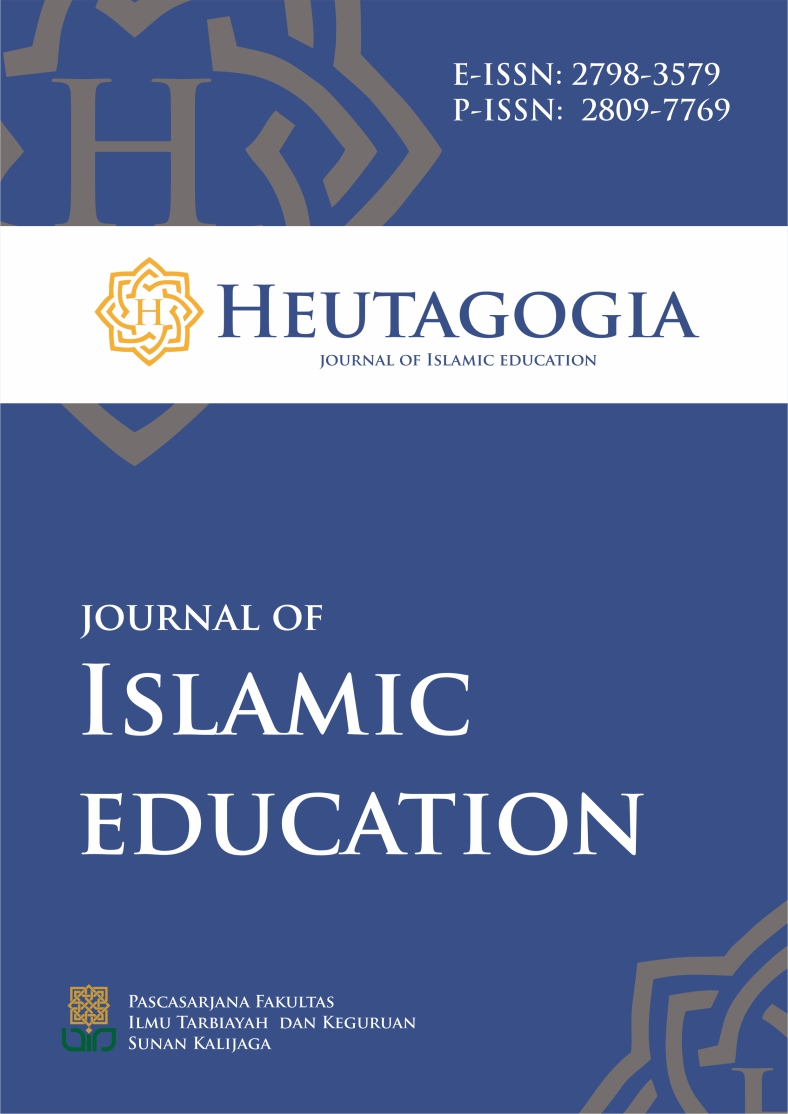The Urgency of Cyber Education in Islamic Education for Indonesia's Golden Generation 2045: A Conceptual Analysis
DOI:
https://doi.org/10.14421/hjie.2024.42-08Keywords:
Cyber education, Islamic education, Digital literacyAbstract
In the context of Indonesia's ambitious goal to cultivate a Golden Generation by 2045, this article examines the urgent need to integrate cyber education within Islamic educational systems. Through a conceptual analysis grounded in descriptive qualitative methods, the study synthesizes insights from 42 recent scholarly works to propose a strategic framework for embedding digital technologies in Islamic pedagogy. The analysis reveals that cyber education, characterized by its interactivity, flexibility, and global reach, holds transformative potential for Islamic schools. However, its adoption is constrained by significant obstacles, including inadequate technological infrastructure, educators' insufficient digital skills, and a lack of coherent policy frameworks. A SWOT analysis further elucidates the strengths, weaknesses, opportunities, and threats associated with cyber education in this context. To overcome these challenges, the study advocates for a comprehensive strategy that includes digital literacy programs, collaborative efforts among stakeholders, and curriculum innovations that harmonize technological advancements with Islamic values. While the research is conceptual and requires empirical substantiation, it offers a valuable foundation for policymakers and educators. The article recommends conducting empirical studies to validate the conceptual model across various educational settings and to foster innovative practices that ensure Islamic education remains relevant and competitive in the digital era.
Downloads
References
Abdul Halik. “Ilmu Pendidikan Islam: Perspektif Ontologi, Epistemologi, Aksiologi.” Istiqra’: Jurnal Pendidikan dan Pemikiran Islam 7, no. 2 (2020): 10–23. http://jurnal.umpar.ac.id/index.php/istiqra/article/view/500.
Ahmad, Kamsuriah, Suhaila Zainudin, dan Shahrina Shahrani. “Interactive STEM in Cyber Awareness Learning System.” In Proceedings of the International Conference on Electrical Engineering and Informatics, 1–5. Scopus, 2023. doi:10.1109/ICEEI59426.2023.10346823.
Alicia, Velma, dan Inta Hataningtyas Rani. “Kontribusi Aplikasi Sistem Manajemen Pembelajaran Berbasis Siber Terhadap Kompleksitas Manajemen Tindakan Kelas.” Jurnal Pendidikan 23, no. 1 (2022): 24–42. doi:10.33830/jp.v23i1.2611.2022.
Alvarez, Isabel Borges, Nuno S Alves Silva, dan Luisa Sampaio Correia. “Cyber education: towards a pedagogical and heuristic learning.” SIGCAS Comput. Soc. 45, no. 3 (2016): 185–192. doi:10.1145/2874239.2874266.
Arshad, Sobia, Masoom Alam, Saif Al-Kuwari, dan Muhammad Haider Ali Khan. “Attack Specification Language: Domain Specific Language for Dynamic Training in Cyber Range.” In 2021 IEEE Global Engineering Education Conference (EDUCON), 873–79, 2021. doi:10.1109/EDUCON46332.2021.9454094.
Blackburn, Ashley, Irene Linlin Chen, dan Rebecca Pfeffer. Emerging Trends in Cyber Ethics and Education. IGI Global, 2019. doi:10.4018/978-1-5225-5933-7.
Darman, Regina Ade. “Mempersiapkan Generasi Emas Indonesia Tahun 2045 Melalui Pendidikan Berkualitas.” Edik Informatika 3, no. 2 (2017): 73–87. doi:10.22202/ei.2017.v3i2.1320.
Eshet, Yoram. “Digital Literacy: A Conceptual Framework for Survival Skills in the Digital era.” Journal of Educational Multimedia and Hypermedia 13, no. 1 (2004): 93–106. https://www.learntechlib.org/p/4793.
Etistika Yuni Wijaya, Dwi Agus Sudjimat, dan Amat Nyoto. “Transformasi Pendidikan Abad 21 Sebagai Tuntutan.” Jurnal pendidikan 1 (2016): 263–78. http://repository.unikama.ac.id/840/32/263-278 Transformasi Pendidikan Abad 21 Sebagai Tuntutan Pengembangan Sumber Daya Manusia di Era Global .pdf. diakses pada; hari/tgl; sabtu, 3 November 2018. jam; 00:26, wib.
Fajrin, Laila. Pendidikan Ideal untuk Mempersiapkan Generasi Emas Indonesia. Yogyakarta: Timur Barat, 2020.
Flack, Nathaniel, dan Mark Reith. “Self-Directed Learning Tools in USAF Multi-Domain Operations Education,” no. December (2018): 2018.
Glantz, Edward J, Michael R Bartolacci, Mahdi Nasereddin, dan David Joseph Fusco. “Cross-Boundary Cyber Education Design.” In Proceedings of the 21st Annual Conference on Information Technology Education, 336–341. SIGITE ’20. New York, NY, USA: Association for Computing Machinery, 2020. doi:10.1145/3368308.3415374.
Graham, Kendra, James Anderson, Conrad Rife, Bryce Heitmeyer, Pranav R. Patel, Scott Nykl, Alan C. Lin, dan Laurence D. Merkle. “Cyberspace Odyssey: A Competitive Team-Oriented Serious Game in Computer Networking.” IEEE Transactions on Learning Technologies 13, no. 3 (2020): 502–15. doi:10.1109/TLT.2020.3008607.
Greenlaw, Raymond, dan Rajendra K Raj. “ABET’s cybersecurity accreditation: history, accreditation criteria, and status.” ACM Inroads 13, no. 4 (November 2022): 14–21. doi:10.1145/3571091.
Hidayah, Ratna, Muhammad Nur Wangid, dan Wuri Wuryandani. “Teaching as Part of Blended Learning Lead to the Trend of Indonesian Future Cyber Education.” International Journal of Intelligent Systems and Applications in Engineering 11, no. 2 SE-Research Article (17 Februari 2023): 484–94. https://ijisae.org/index.php/IJISAE/article/view/2658.
Hills, Michael, Chris Gamrat, dan Carson Brown. Classroom Engagement Activities with the Raspberry Pi, 2019. doi:10.1145/3349266.3351358.
Hudnall, Matthew. “Educational and Workforce Cybersecurity Frameworks: Comparing, Contrasting, and Mapping.” Computer 52, no. 3 (2019): 18–28. doi:10.1109/MC.2018.2883334.
Jacob, Johanna, Michelle Peters, dan T Andrew Yang. Interdisciplinary Cybersecurity : Rethinking the Approach and the Process. Springer International Publishing, 2020. doi:10.1007/978-3-030-31239-8.
Karyanto, Umum Budi. “Pendidikan Karakter: Sebuah Visi Islam Rahmatan Lil Alamin.” EDUKASIA ISLAMIKA: Jurnal Pendidikan Islam 2, no. 2 (2017): 191–207. doi:https://doi.org/10.28918/jei.v2i2.1668.
Knüpfer, Marcus, Tore Bierwirth, Lars Stiemert, Matthias Schopp, Sebastian Seeber, Daniela Pöhn, dan Peter Hillmann. “Cyber Taxi: A Taxonomy of Interactive Cyber Training and Education Systems.” In Model-Driven Simulation and Training Environments for Cybersecurity: Second International Workshop, MSTEC 2020, Guildford, UK, September 14–18, 2020, Revised Selected Papers, 3–21. Berlin, Heidelberg: Springer-Verlag, 2020. doi:10.1007/978-3-030-62433-0_1.
Krutz, Daniel E, dan Thomas Richards. “Cyber security education: why don’t we do anything about it?” ACM Inroads 8, no. 4 (2017): 5. doi:10.1145/3132217.
Lee, Seung-Hyun. “Digital Literacy Education for the Development of Digital Literacy.” Int. J. Digit. Lit. Digit. Competence 5, no. 3 (2014): 29–43. doi:10.4018/ijdldc.2014070103.
Lehto, Martti. “Cyber Security Capacity Building: Cyber Security Education in Finnish Universities.” In European Conference on Cyber Warfare and Security, 2017. doi:10.34190/EWS.20.112.
Maddy, Joshua, Eric M Dillon, dan Husnu S Narman. “Adapting Cybersecurity Teacher Training Camp to Virtual Learning.” In 2023 IEEE Integrated STEM Education Conference (ISEC), 301–8, 2023. doi:10.1109/ISEC57711.2023.10402194.
Madleňák, Matúš, dan Katarína Kampová. “Phishing as a Cyber Security Threat.” In 2022 20th International Conference on Emerging eLearning Technologies and Applications (ICETA), 392–96, 2022. doi:10.1109/ICETA57911.2022.9974817.
Muafiah, Evi, Ayu Desrani, Sekolah Tinggi, Agama Islam, Apri Wardana Ritonga, Universitas Islam, Negeri Maulana, Malik Ibrahim, dan Arif Rahman Hakim. “Trends of Educational Technology (EdTech): Students ’ Perceptions of Technology to Improve the Quality of Islamic Higher Education in Indonesia.” International Journal of Learning, Teaching and Educational Research 21, no. 6 (2022): 226–46. doi:doi.org/10.26803/ijlter.21.6.14.
Muddin, Moh. Ali, dan Firmanda Dwi Septiawan. “CLS (Cyber Learning Santri): Optimalisasi Proses Pembelajaran Pondok Pesantren Salafiah sebagai Upaya Merealisasikan Visi Indonesia Maju Menuju Indonesia Emas 2045 (Studi Kasus: Pondok Pesantren Assalafiyah 1 Luwungragi Brebes).” Jurnal Penelitian Inovatif 2, no. 1 (2022): 51–58. doi:10.54082/jupin.43.
Nasaruddin, Abdul Halik, St. Wardah Hanafie Das, dan Suyatno Ladiqi. “Digital-Based Islamic Religious Education (IRE) Learning Model at Senior High School.” Indonesian Journal of Islamic Education Studies (IJIES) 6, no. 1 (2023): 79–92. doi:10.33367/ijies.v6i1.3525.
Otero-Pailos, Jorge. “Living or Leaving the Techno-Apocalypse: Paul Virilio’s Critique of Technology and Its Contribution to Architecture.” Journal of Architectural Education (1984-) 54, no. 2 (18 Mei 2000): 104–10. http://www.jstor.org/stable/1425597.
Pendleton, Aaron, dan James S Okolica. “Creating Serious Games with the Game Design Matrix.” In International Conference Games and Learning Alliance, 2020. https://api.semanticscholar.org/CorpusID:208179494.
Rahman, Bambang Arif. “Islamic revival and cultural diversity: Pesantren’s configuration in contemporary Aceh, Indonesia.” Indonesian Journal of Islam and Muslim Societies 12, no. 1 (2022): 201–29. doi:10.18326/ijims.v12i1.201-229.
Reith, Mark, Eric Trias, Chad Dacus, Seth Martin, dan Landon Tomcho. “Rethinking USAF Cyber Education and Training.” In International Conference on Cyber Warfare and Security, 2018.
Ritonga, Mahyudin. “Modulasi Kitab Kuning Bidang Fiqh Berbasis Materi UAM di Pondok Pesantren Darul Ulum Air Pacah.” Jurnal Kajian dan Pengembangan Masyarakat 1, no. 1 (2018): 1–13.
Riyanto, Waryani Fajar, dan Robby Habiba Abror. “Filsafat Digital Integral: Reformulasi Program Literasi Digital Nasional Di Era Pandemi Covid-19 Di Indonesia.” FIKRAH 9, no. 2 (2021): 203–21.
Senanayake, Rukman, Phillip Porras, dan Jason Kaehler. “Revolutionizing the Visual Design of Capture the Flag (CTF) Competitions.” In HCI for Cybersecurity, Privacy and Trust, diedit oleh Abbas Moallem, 339–52. Cham: Springer International Publishing, 2019.
Shannon, Loane. “Distance Education and Accreditation,” 2001. https://www.govinfo.gov/app/details/ERIC-ED464525.
Shukla, Sonal, dan Anand Sharma. “Cyber security using Machine Learning in Digital Education industry.” In 2021 International Conference on Innovative Computing, Intelligent Communication and Smart Electrical Systems (ICSES), 1–6, 2021. doi:10.1109/ICSES52305.2021.9633786.
Sobiesk, Edward, Jean Blair, Gregory Conti, Michael Lanham, dan Howard Taylor. “Cyber Education: A Multi-Level, Multi-Discipline Approach.” In Proceedings of the 16th Annual Conference on Information Technology Education, 43–47. SIGITE ’15. New York, NY, USA: Association for Computing Machinery, 2015. doi:10.1145/2808006.2808038.
Stines, Alan. “Faculty perceptions of open educational resources in cyber curriculums.” Issues in Information Systems 25, no. 2 (2024): 418–37. doi:10.48009/2_iis_2024_133.
Syaukani, Syaukani. “Menuju Indonesia Emas Dalam Perspektif Pendidikan Islam.” Jurnal Pendidikan Agama Islam Al-Thariqah 2, no. 1 (30 Agustus 2017): 111–23. doi:10.25299/althariqah.2017.vol2(1).651.
Syed Shahab Uddin. “Importance of Cyber Education in the Era of Cyber War.” Pakistan Journal of Educational Research 5, no. 2 (2022): 250–60. doi:10.52337/pjer.v5i2.530.
Tarrad, Khalid Mukhlif, Hanen Al-Hareeri, Tawfeeq Alghazali, Mohammed Ahmed, Mohammed Kadhim Abbas Al-Maeeni, Ghadban Abdullah Kalaf, Refad E. Alsaddon, dan Yaqeen S. Mezaal. “Cybercrime Challenges in Iraqi Academia: Creating Digital Awareness for Preventing Cybercrimes.” International Journal of Cyber Criminology 16, no. 2 (2022): 15–31. doi:10.5281/zenodo.4766564.
Tick, Andrea, dan Phuong Thao Mai. “Cyber Security Awareness and the Behaviors of Higher Education Students , using Smartphones in Vietnam” 21, no. 12 (2024): 111–31.
Wahyudi, Dedi, dan Novita Kurniasih. “Membangun Generasi ‘Great’ Beretika Menuju Indonesia Emas.” Tarbawiyah Jurnal Ilmiah Pendidikan 3, no. 1 (2019): 46. doi:10.32332/tarbawiyah.v3i1.1453.
Witsenboer, Jacob Willem Abraham, Klaas Sijtsma, dan Fedde Scheele. “Measuring cyber secure behavior of elementary and high school students in the Netherlands.” Computers & Education 186 (2022): 104536. doi:10.1016/j.compedu.2022.104536.
Yulian, Ryani, Ufi Ruhama’, dan Syarifah Putri Agustini Alkadri. “PELATIHAN PENGEMBANGAN FLIPPED CLASSROOM BERBASIS HIGHER-ORDER THINKING SKILLS (HOTS) DAN KURIKULUM MERDEKA BAGI MGMP BAHASA INGGRIS SMA KABUPATEN KUBU RAYA.” Jurnal Abdi Insani 10, no. 3 (13 September 2023): 1647–57. doi:10.29303/abdiinsani.v10i3.1085.
Yuliani Nurani Lathipah Hasanah, Niken Pratiwi. “Digital Media based on Pancasila Values to Stimulate Character Building in Early Childhood.” Journal for ReAttach Therapy and Developmental Diversities 5, no. 1 (30 Juni 2022): 41–49. https://jrtdd.com/index.php/journal/article/view/59.
Zen, Zelhendri. “Inovasi Pendidikan Berbasis Teknologi Informasi : Menuju Pendidikan Masa Depan.” E-Tech 6, no. 2 (2018). doi:10.24036/et.v2i2.101346.
Zwilling, Moti. “Trends and Challenges Regarding Cyber Risk Mitigation by CISOs—A Systematic Literature and Experts’ Opinion Review Based on Text Analytics.” Sustainability (Switzerland) 14, no. 3 (2022). doi:10.3390/su14031311.
Downloads
Published
How to Cite
Issue
Section
License

This work is licensed under a Creative Commons Attribution-NonCommercial 4.0 International License.















